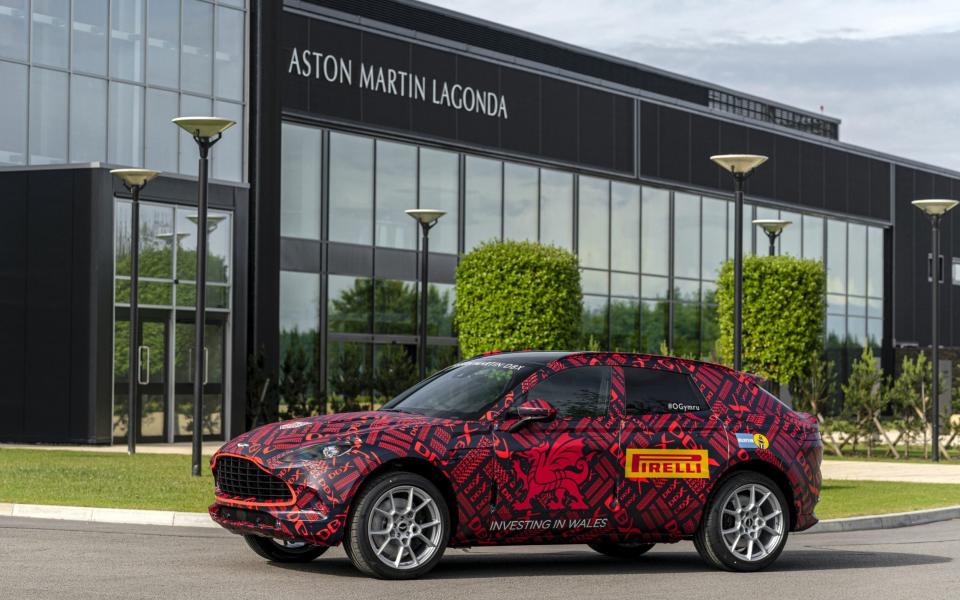Aston Martin's first SUV attracts new buyers

Aston Martin sales have surged as consumers flocked to buy a new SUV from the troubled luxury car maker.
The business sold 1,353 cars in the first three months of 2021, more than double the 578 sales it made a year earlier. Around half of the cars sold this year were its DBX model, a 4x4 which costs at least £158,000.
Revenue jumped 153pc to £224m and pre-tax losses more than halved to £42m.
The sales are a boost for executive chairman Lawrence Stroll, a billionaire motoring enthusiast who took charge of Aston in January 2020 after mounting losses and a brutal run of share price performance.
Mr Stroll has bet the company's future on the success of the DBX, insisting it would prove popular with drivers seeikng an ultra-high end SUV.
The strongest demand in the first quarter came from China where sales jumped 900pc, Mr Stroll said. He said there is far more appetite for SUVs than sports cars in the Chinese market, where 20pc of buyers are female.
Losses were reduced by what Mr Stroll described as an expensive but necessary decision to clear unsold stock languishing in forecourts. Aston now only builds cars to order, and expects to sell 6,000 vehicles this year.

The average selling price rose by £36,000 to £149,000, reflecting buyers opting for the DBX, which has a higher starting price than Aston’s sports cars, and drivers picking more expensive models.
The results mean Aston is on course to hit its five-year “Project Horizon” plan, targeting annual sales of 10,000 cars, revenue of £2bn and underlying earnings £500m, Mr Stroll said.
Success of the DBX means that the 10,000 target could be lifted in the longer term, with four or five variants built on the same platform as the SUV.
Unlike other larger car manufacturers, production at the firm has not been affected by microchip shortages ravaging the industry.
Tobias Moers, chief executive, said: “Sometimes it is an advantage to be small.”

Aston returned to Formula 1 this year, with Mr Stroll saying the £20m the company paid in sponsorship to his team had returned “10 times the amount” in value and driven 30,000 people onto the company's online car configurator. His son Lance is one of the team's drivers.
Mr Stroll said: “I cannot tell you what it has done for us since the first race when an Aston Martin safety car came out. It’s overwhelming.”
A new budget cap of $145m (£105m) for Formula 1 has levelled the playing field, he said, predicting tyhat Aston will be able to challenge larger teams that used to be impossible to beat because they spent far more.
Citi analysts said Aston’s results were strong, and shares rose by 1.5pc.
Meanwhile, Volkswagen said first-quarter profit surged to €3.4bn (£2.9bn) from €517m a year ago as the German car titan rebounded from the initial impact of coronavirus.
However it also warned of intensifying problems with shortages of computer chips that are hitting production of cars.
Arno Antlitz, chief finance officer, said: “The shortage of semiconductors throughout the industry is expected to have a more significant impact in the second quarter than before. Nevertheless, we are confident regarding business development in the full year.”
Thousands of VW staff have been put on reduced working hours and production has been cut because of shortages of chips which modern cars increasingly rely on.
During the first three months of 2021, VW - which also owns Audi, Porsche and Seat - delivered 2.4m cars and sales rose 13pc to €62.4bn. Demand for electric vehicles more than doubled to 133,000. VW is investing more than €30bn in electric models.
Performance was driven by recovering sales in China, the world’s largest car market, strong demand for upmarket models which are more profitable.
VW said it now expects full-year sales to be significantly higher than last year, when it handed over the keys to 9.2m vehicles.
The forecast for the return on sales was also raised to between 5.5pc and 7pc, up from 5pc and 5.5pc.

 Yahoo Finance
Yahoo Finance 